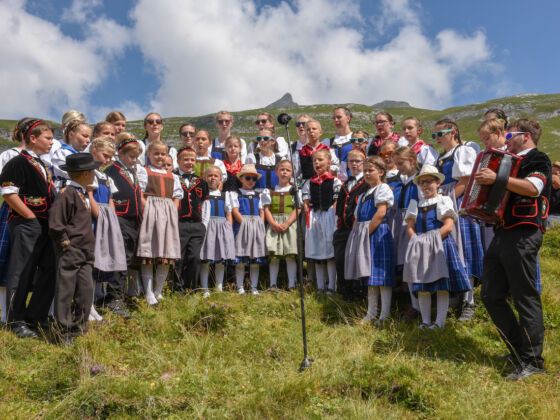THE ROOM IS VIBRATING with tones, and before I’m ready, it’s my turn. With a swift movement of his arm, our instructor, Thomas Sutter, indicates that I should add my note to the group. My voice is shaky, clearly out of tune, but I continue to push air through my diaphragm, belting out new notes in time with Thomas’ conducting.

I open my throat more, reaching for lower tones, then snag a quick breath as I move into a higher octave. Around me, the others in my group have situated their lips in varying “O” shapes as well. It’s hard to believe that, together, we’re actually yodeling.
Bart Plantenga, author of Yodel-Ay-Ee-Oooo: The Secret History of Yodeling Around the World, suggests that yodeling likely originated in Africa about 10,000 years ago, but most people today tie the act to the mountains of Europe, and rightly so. Travelers could potentially encounter yodelers in France, the Netherlands or Austria, but the fact of the matter is that Switzerland is the place most closely associated with this art.
In Switzerland, yodeling was used by early Alpine farmers to round up cattle and to communicate with other shepherds also wandering the Alps. The practice is still used today as cattle are herded out of the mountains for the winter.
I’m not herding cattle or letting my voice echo across the mountains, but I am in a second floor classroom in the Appenzell region of Switzerland. Our goal is to learn how to yodel, which I seem to be failing at miserably, given the look Thomas gives me out of the corner of his eye as I straddle notes throughout the song. Different regions of Switzerland have different types of yodels, and in Appenzell, yodeling is slower and composed of tones instead of actual words, which makes it a little easier as my voice shakes throughout the song.
Thomas comes from a long line of yodelers. He’s always lived in Appenzell, and he embraces the yodeling culture of the region. Dressed in thick leather suspenders with brass ornamentation, leather shoes and an embroidered vest with a single earring in one ear, he embodies the fairy tale version of yodelers I’d seen in picture books as a kid.
He’s split our group into five different parts: A main line sung by two women, melodic counterparts sung by two other groups of women (one of which I am a member) and two melodic counterparts sung by the men. I stand on the edge of the group, completely aware of how out of tune I am but embracing the challenge anyway.
Once we’ve mastered the song, which hardly lasts a minute, Thomas hands out big bowls and coins. We’ve moved on from yodeling and are now tasked with learning talerschwingen—a musical accompaniment to the yodeling that requires spinning the coins in the brass bowls to create different background tones. Compared to singing, this task is simple, and I quickly learn how to flick my wrist so the coin begins spinning in the bowl.
After we’ve all had a chance to practice talerschwingen, he asks for volunteers to do this as background music to the yodeling. I eagerly offer my services, hoping it will get me out of the singing. Instead I end up not only spinning a coin in a bowl but I also have to belt out my tones in time with the rest of the yodelers. We practice the song a few times with all of the singing parts as well as the talerschwingen, and then Thomas announces that we’re ready.
Ready for what? I wonder.
He walks us down the stairs and through the doors to the narrow roads that criss-cross through town. We walk together to an open square where several of the roads intersect and places us choir style in the middle of the space. There’s already a crowd gathering. Old men lean on their umbrellas waiting patiently for our performance. Women who have been out shopping shift their children to the other hip and stop to listen, small smiles on their faces.
Thomas points in my direction. I flick the coin into the bowl and the low, hollow sound fills the open air. The other two people who have been chosen to do the talerschwingen drop their coins in their bowls. Thomas raises his arms, drops them triumphantly and I begin yodeling.
Community Connection
Have a learning experience to share? Check out our Call for Submissions and submit your story to Matador Abroad.